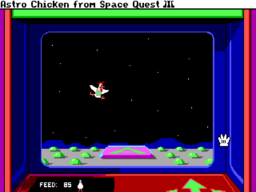| Astro Chicken | ||
|---|---|---|

| ||
| First release | 1988 | |
| Also known as | N/A | |
| Developed by | Sierra | |
| Published by | Sierra | |
| Distributed by | Sierra | |
| Platforms | MS-DOS | |
| Resolution | 320x200, 16 colors | |
| Engine | SCI | |
| Support | Since ScummVM 1.2.0 | |
| Available for Purchase |
Available from our demos page | |
Astro Chicken was the arcade game by the fictional company ScumSoft in Space Quest III. It was released as a standalone game as a demo teaser for Space Quest III. The object of the game is to get Astro Chicken to land on the landing pad. Press up to flap Astro Chicken's wings, press left to move left, right to move right, and down to stop left/right movement. If you hit the landing pad too fast, you'll bounce off. If you miss the landing pad, you'll explode. If you fly too high, you'll bounce off the atmosphere and fall back to the planet's surface. There is a chicken feed meter in the left hand corner. If you run out of chicken feed, Astro Chicken will no longer be able to flap his wings.
Space Quest IV had an arcade game that was a sequel to this game, called Ms. Astro Chicken. Sierra also released Ms. Astro Chicken as a standalone game.
Installation
Required data files
For more information on how ScummVM uses game data files, see the user documentation.
WARNING: Unlike other games, SCI games have significant variation in the naming of required files.
They also can load supplementary files by resource maps, so it is recommended to keep all files in the game data directory from the CD.
Unless otherwise specified, do NOT remove any file from the directory, even if it does not appear on the following list, since this will likely cause weird bugs.
Copy all files to the game directory. Some games need additional work:
Floppy games with RESOURCE.p01, p02, etc. and/or RESOURCE.a01, a02, etc. files
- Concatenate all RESOURCE.p0* files to RESOURCE.000 (e.g.
copy /b RESOURCE.p0* RESOURCE.000on Windows, orcat RESOURCE.p0* > RESOURCE.000on *nix). - Concatenate all RESOURCE.a0* files to RESOURCE.AUD (e.g.
copy /b RESOURCE.a0* RESOURCE.AUDon Windows, orcat RESOURCE.a0* > RESOURCE.AUDon *nix).